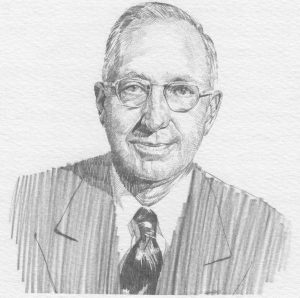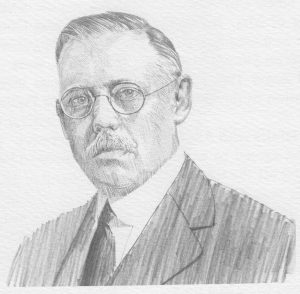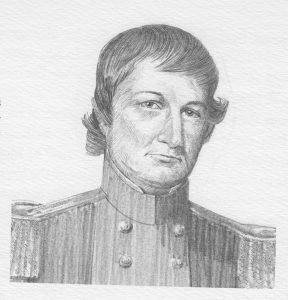Shortly after the tum of the century, William Albert Bellingrath moved to Montgomery, Alabama, where he began to earn his reputation as a pioneer in the Coca-Cola bottling industry and as a leader in the civic and social welfare of Montgomery and the State of Alabama.
Born in Atlanta, Georgia, on January 30, 1868, he was the sixth child and fourth son of Leonard and Catherine Jean (McMillan) Bellingrath. In 1882, the family moved to Castleberry, Alabama, where the young Will lived until he sought a livelihood in the retail grocery business in Anniston. By 1901, the young man had become manager of the commissaries of the Woodstock Coal and Iron Company.
In this position, he noticed a growing demand among the workers for a new beverage and he developed a keen interest in the future of Coca-Cola.
The young Coca-Cola Company of Atlanta, owned by Asa G. Candler, had established a policy of leaving the bottling and distribution of Coca-Cola to local companies under a franchise. Recognizing the possibilities in the field, William A. Bellingrath and his brother, Walter D. Bellingrath, turned their eyes to Montgomery where the Coca-Cola franchise had been granted to Rainey and Cole in 1902. By 1903, the brothers were able – based on their honesty and the faith of a friend – to obtain a loan from the First National Bank of Montgomery in order to complete the $5,000 purchase of the Montgomery franchise. (William Bellingrath later became a director of the bank and helped establish its importance in the economic life of Montgomery.)
Exercising extraordinary business abilities in times of economic stress, the Bellingraths were able to pay off their indebtedness within a few years and purchase the Mobile franchise. Walter D. Bellingrath assumed ownership of the Mobile operation. William A. Bellingrath remained in Montgomery where he devoted the rest of his life to the development of his business and the community.
Will Bellingrath became known as a pioneer in the Coca-Cola bottling industry because of his farsightedness. He was among the first to use automobile trucks and to make store deliveries. He installed the first modern machinery in a bottling plant in the South. By 1926, he had made his bottling plant into a modern model plant. Always active in the Coca-Cola Bottlers’ Association, he served as its president in 1916.
Though he devoted much of his effort to the Coca-Cola business which first brought him real success, he extended his activities in the business world to many other businesses and industries which meant much to the development of his home city and the state.
This student of men and affairs, who lacked complete schooling in his early days, had a peculiar faculty of using his store of personally acquired knowledge to the fullest extent, not only for himself but also for others. He became known as a man who could be relied on for sound counsel and advice. His unerring honesty, calm judgment, and far-sighted vision brought him to elected leadership in civic affairs.
For many years, he served as a director of the Montgomery Chamber of Commerce, and at the time of his death, was the only Montgornerian to have served four terms as president of this organization. Under his leadership, the Chamber was able to help implement the establishment of the tactical school at Maxwell Field; to encourage the development of dairy and poultry production and of meat and processing plants; to facilitate the establishment of Kilby Prison and of manufacturing plants.
According to a close friend, Will Bellingrath rarely took credit for his achievements. But “the smokestacks of Montgomery, improved agricultural conditions of Central Alabama, growth of financial institutions in Montgomery, the development of better markets in Central Alabama, and many other pieces of evidence of progress (were) but measures of the activity and intelligent efforts of a splendid, forthright citizen who, though a civic leader, was always willing to give credit to others for achievements that were largely results of his endeavors.”
William Bellingrath was also a quiet philanthropist. He was generous to institutions and to local charities, but his individual charity extended beyond the knowledge of even his intimate friends. On record are his and his wife’s (nee Mary Nesbitt Elmore of Montgomery, whom he married in 1906) contributions to Huntingdon College of Montgomery where a building bears the name Bellingrath Hall. A deacon and elder in the Presbyterian Church, he gave generously of his time and means to the church and to the Presbyterian Horne for Orphans at Talladega. He was a contributor to and a trustee of Agnes Scott College in Atlanta. But he also gave much to young people seeking an education – gifts which were heard of only when the recipients or his friends spoke of them.
At the time of his death on March 11, 1937, William A. Bellingrath was described as the “First Citizen of Montgomery … ” “a deacon and elder of the Presbyterian Church … who walked daily in the faith of a living God … ” a man who “walked unafraid through a long and useful life.”
And sixteen years after his death when the Montgomery Coca-Cola Bottling Company celebrated its 50th anniversary, The Alabama Journal ran a special article about Will Bellingrath’s contributions to the economic, religious, cultural, and social life of the city. The article quoted the obituary from the March 12, 1937, Montgomery Advertiser:
“The city and county knew him as a leader in the field of industry and business, also a philanthropist and a Christian gentleman, always kind and considerate of his fellow man. Mr. Bellingrath’s altruism and generosity extended to charitable organizations, his church, to worthy individuals, and to the development of the community.”
William Bellingrath is survived by three daughters, Mrs. Elmore Bellingrath Bartlett (Dr. Haywood), Mrs. Jean Bellingrath Lane (McMillan), and Mrs. Suzanne Bellingrath von Gal (George, Jr.).
In addition to his daughters, he is survived by ten grandchildren and 27 great-grandchildren. (The primary source of this biographical information was an article in The Montgomery Advertiser, by Jesse B. Hearn, long-time associate of William A. Bellingrath, as reprinted in the Coca-Cola Bottler, in April 1937.)




